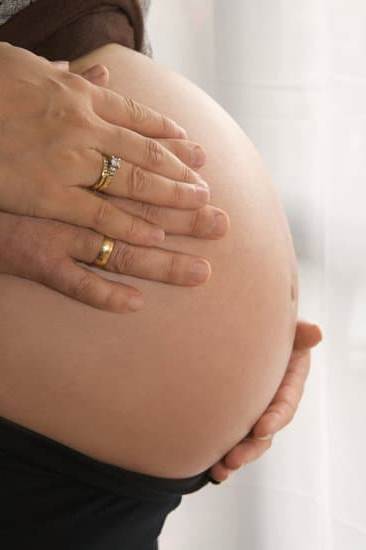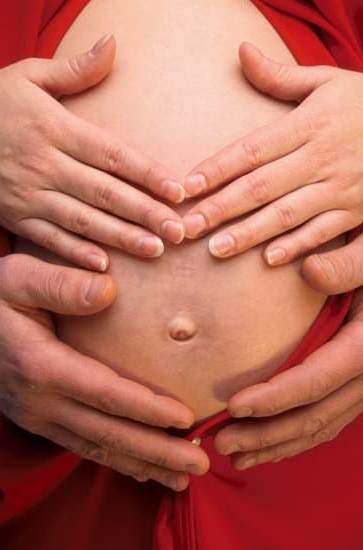When does pregnancy spotting start? Understanding pregnancy spotting is essential for expectant mothers to navigate their journey to motherhood with confidence and knowledge. Pregnancy spotting, though often harmless, can sometimes cause concern for women. It is crucial to differentiate between normal spotting and potentially problematic bleeding during pregnancy to ensure the health and well-being of both the mother and the developing baby.
Pregnancy spotting, which refers to light bleeding that occurs when a fertilized egg implants itself in the uterus, can be a common occurrence in early pregnancy. This light bleeding generally differs from the heavier flow experienced during menstruation. While it can be alarming for some women, understanding when pregnancy spotting typically starts can help alleviate anxiety and provide reassurance during this crucial period.
In most cases, pregnancy spotting begins around one to two weeks after conception, coinciding with the time of implantation. This timing aligns with when a woman would typically expect her next menstrual cycle if not pregnant.
Recognizing when pregnancy spotting starts can help expectant mothers differentiate between it and other forms of bleeding that may occur later in pregnancy for various reasons or complications. Understanding these nuances is vital for women to monitor their health throughout their nine months of gestation effectively.
What Is Pregnancy Spotting?
Pregnancy spotting can be a source of concern for many expectant mothers, as any vaginal bleeding during pregnancy can understandably cause worry. Spotting is defined as light bleeding that occurs outside of your regular menstrual cycle. It may appear as small amounts of blood on your underwear or toilet paper after wiping. This phenomenon is relatively common and can happen at various stages of pregnancy, but understanding the underlying causes and knowing when to seek medical advice are crucial.
Spotting during pregnancy is often caused by the implantation of the fertilized egg in the uterus, a process known as implantation bleeding. This typically occurs around 6 to 12 days after conception and is one of the earliest signs of pregnancy. Hormonal changes during early pregnancy can also lead to light spotting. Additionally, cervical changes, such as increased blood flow to the area, can cause some women to experience spotting throughout their entire pregnancy.
The timing of when pregnancy spotting starts can vary from woman to woman. Some may notice spotting as early as one week after conception, while others may not experience it until later in their first trimester.
It’s essential to monitor any bleeding closely and familiarize yourself with other signs and symptoms of complications such as ectopic pregnancy or miscarriage, especially if you have risk factors or concerns about your pregnancy. Remember that every woman’s experience with spotting during pregnancy is unique, so it’s always best to consult with your healthcare provider for individualized guidance and care.
Causes of Pregnancy Spotting
Pregnancy spotting can be a source of concern for many expectant mothers, as it can sometimes signal underlying issues. One possible cause of pregnancy spotting is implantation bleeding, which occurs when the fertilized egg attaches itself to the uterine lining. This usually happens around 6-12 days after conception, and is often mistaken for a light period. Hormonal changes in early pregnancy can also lead to spotting as the body adjusts to the presence of a developing fetus.
Another common cause of pregnancy spotting is cervical irritation or sensitivity. During pregnancy, the cervix becomes softer due to increased blood flow and hormonal changes. This can make it more prone to irritation from activities such as sexual intercourse or vaginal exams. In some cases, cervical polyps or inflammation can also lead to spotting during pregnancy.
Additionally, certain complications such as ectopic pregnancy or miscarriage can cause pregnancy spotting. An ectopic pregnancy occurs when the fertilized egg implants outside the uterus, typically in the fallopian tube. This can cause vaginal bleeding and abdominal pain. Miscarriage, on the other hand, refers to the loss of a pregnancy before 20 weeks gestation. Both ectopic pregnancy and miscarriage require immediate medical attention to prevent further complications for both mother and baby.
| Possible Causes of Pregnancy Spotting | Description |
|---|---|
| Implantation Bleeding | Occurs when fertilized egg attaches to uterine lining around 6-12 days after conception. |
| Cervical Irritation | Softening of cervix during pregnancy may lead to irritation from activities like sex or exams. |
| Complications (Ectopic Pregnancy/Miscarriage) | Ectopic pregnancies implant outside uterus; miscarriages result in loss before 20 weeks gestation. |
When Does Pregnancy Spotting Start?
Pregnancy spotting is a common occurrence during pregnancy that can often cause concern for expectant mothers. It is essential to have a clear understanding of when pregnancy spotting typically starts to help alleviate any unnecessary worry. Spotting in early pregnancy is usually light vaginal bleeding, which occurs when the fertilized egg attaches itself to the uterine lining, known as implantation bleeding. Knowing when this spotting may begin can provide comfort and reassurance to pregnant individuals.
Timing of Pregnancy Spotting
When does pregnancy spotting start? Usually, pregnancy spotting can occur around six to twelve days after conception, which aligns closely with the time of expected menstruation for many women. This timing may vary from person to person, but it commonly coincides with the expected start date of their menstrual cycle. The length and intensity of spotting can also differ among individuals, with some experiencing only minimal spotting while others may have slightly heavier bleeding.
Factors Influencing Onset of Pregnancy Spotting
Several factors can influence when pregnancy spotting starts, including hormonal changes, gestational age, and overall health conditions. Additionally, some women may not experience any spotting at all during their pregnancy, which is also considered normal.
It is crucial to remember that every pregnancy is unique, and what may be typical for one person may not be the same for another. If you are unsure about any bleeding or spotting you are experiencing during pregnancy, consulting with your healthcare provider is recommended for guidance and reassurance.
Signs and Symptoms of Pregnancy Spotting
Pregnancy spotting, also known as implantation bleeding, occurs when a fertilized egg attaches itself to the lining of the uterus. This can result in some light bleeding or spotting, which is typically lighter and shorter in duration than a typical menstrual period. Understanding the signs and symptoms of pregnancy spotting can help expectant mothers distinguish it from other types of bleeding during pregnancy.
Signs of Pregnancy Spotting
One common sign of pregnancy spotting is light vaginal bleeding that may be pinkish or brownish in color. This type of bleeding usually occurs around the time of your expected period but is much lighter and shorter in duration. Some women may also experience cramping along with the spotting, similar to menstrual cramps, but milder in intensity.
Symptoms of Pregnancy Spotting
In addition to light bleeding, you may also experience other symptoms during pregnancy spotting. These can include mild backaches, breast tenderness, nausea, and fatigue. It’s essential to pay attention to these symptoms and consult with your healthcare provider if they persist or worsen over time. Keep track of when you experience these symptoms as it can help your doctor determine the cause and provide proper guidance on next steps.
When Does Pregnancy Spotting Start?
Pregnancy spotting typically occurs around 6-12 days after conception when the fertilized egg implants itself into the uterine lining. This timing often coincides with when a woman would expect her next period.
However, it’s important to note that not all pregnant women will experience implantation bleeding, so its absence does not necessarily indicate a problem with the pregnancy. If you are unsure about whether your bleeding is normal or not, it’s best to consult with your healthcare provider for personalized advice and care.
How Long Does Pregnancy Spotting Last?
Pregnancy spotting can be a common concern for many expectant mothers. Understanding how long pregnancy spotting lasts can help alleviate some of the worries associated with this symptom. In most cases, pregnancy spotting can last anywhere from a few hours to a few days, depending on various factors.
Factors that can impact how long pregnancy spotting lasts include the underlying cause of the spotting, the overall health of the mother and the fetus, and any interventions or treatments that may be recommended by healthcare providers. It’s essential to keep in mind that every pregnancy is unique, so the duration of pregnancy spotting can vary from woman to woman.
To provide a clearer picture of how long pregnancy spotting may last, here are some key points to consider:
- For implantation bleeding: Implantation bleeding typically occurs around 10 to 14 days after conception and may last for a couple of hours up to two days.
- For hormonal changes: Hormonal fluctuations during early pregnancy can lead to occasional spotting that may last for a few days or up to a week.
- For other causes: Pregnancy spotting caused by issues such as infections or cervical changes may persist until the underlying condition is addressed and resolved.
By keeping track of when pregnancy spotting starts and monitoring its duration, mothers-to-be can better inform their healthcare providers and address any concerns promptly. Remember that while light bleeding or spotting during pregnancy is not uncommon, persistent or heavy bleeding should always be evaluated by a medical professional.
Is Pregnancy Spotting Normal?
Pregnancy spotting can be a common occurrence for many expectant mothers, but it can also raise concerns and questions about the health of the pregnancy. Understanding whether pregnancy spotting is normal or not is essential for expecting mothers. In most cases, pregnancy spotting can be considered normal, especially when it occurs during the early stages of pregnancy. It is important to differentiate between normal spotting and potential complications that may require medical attention.
When does pregnancy spotting start? Pregnancy spotting can begin as early as implantation, which occurs around 6-12 days after fertilization. During implantation, some women may experience light bleeding or spotting as the fertilized egg attaches itself to the uterine lining.
Additionally, hormonal changes throughout pregnancy can also contribute to spotting, particularly during the first trimester. While spotting during early pregnancy is often considered normal, it is always best to consult with a healthcare provider to rule out any underlying issues.
It is crucial for pregnant women to pay attention to the timing, color, and amount of spotting they experience. While light pink or brownish spotting is generally considered normal during early pregnancy, heavier bleeding or bright red blood may indicate a potential problem.
It is important for expectant mothers to trust their instincts and seek medical advice if they are unsure about the cause of their pregnancy spotting. Regular prenatal care can also help monitor and address any concerns related to pregnancy spotting throughout gestation.
When to Seek Medical Help for Pregnancy Spotting
When it comes to pregnancy spotting, it is crucial for expectant mothers to be aware of when to seek medical help. While spotting can be normal during pregnancy, there are instances where it may indicate a more serious underlying issue that requires medical attention. If you experience any concerning symptoms or have any doubts about the cause of your spotting, it is important to consult with your healthcare provider.
One of the key indicators that you should seek medical help for pregnancy spotting is if the bleeding becomes heavy or is accompanied by severe cramping or abdominal pain. This could be a sign of a miscarriage, ectopic pregnancy, or other complications that require immediate medical intervention. Additionally, if you notice clots in the blood or experience dizziness, fainting, or shortness of breath along with spotting, it is imperative to seek medical attention right away.
Furthermore, if you have a history of pregnancy complications such as preterm labor or placental problems, it is advisable to consult with your healthcare provider as soon as you notice any signs of spotting. Your doctor will be able to evaluate your condition and provide appropriate guidance based on your individual circumstances. Remember, it is always better to err on the side of caution and seek medical help promptly when dealing with pregnancy spotting.
Tips for Managing Pregnancy Spotting
Pregnancy spotting can be a worrying experience for expectant mothers, but there are ways to manage and cope with this common occurrence. Here are some tips to help you navigate through pregnancy spotting:
- Stay hydrated: Drinking plenty of water can help keep your body hydrated and may potentially reduce the likelihood of spotting.
- Avoid strenuous activities: While light exercise is generally safe during pregnancy, it’s important to avoid heavy lifting or strenuous activities that could potentially trigger or worsen spotting.
- Rest and relax: Getting an adequate amount of rest can help your body recover and reduce stress, which may also contribute to decreased spotting.
It’s essential to maintain open communication with your healthcare provider throughout your pregnancy, especially if you experience any concerning symptoms like pregnancy spotting. They can provide guidance on how to manage your specific situation and offer reassurance when needed.
- Monitor your symptoms: Keep track of the frequency, duration, and intensity of your pregnancy spotting. This information can be useful for discussing with your healthcare provider during prenatal appointments.
- Follow a balanced diet: Eating a nutritious diet rich in fruits, vegetables, whole grains, and lean proteins can help support a healthy pregnancy and possibly minimize episodes of spotting.
By following these tips for managing pregnancy spotting, you can take proactive steps towards promoting a healthy pregnancy while maintaining peace of mind throughout this journey. Remember that every woman’s experience with pregnancy is unique, so consult with your healthcare provider for personalized advice on managing spotting during this special time.
Conclusion
In conclusion, it is essential for individuals to stay informed about pregnancy spotting in order to better understand what it entails and how to manage it effectively. Pregnancy spotting can start as early as implantation, which usually occurs around 6-12 days after conception. It can also occur throughout the pregnancy for various reasons such as hormonal changes, cervical irritation, or more serious underlying conditions.
Recognizing the signs and symptoms of pregnancy spotting is crucial in order to differentiate it from other types of bleeding. While light spotting can be normal during pregnancy, heavy bleeding accompanied by severe abdominal pain or cramping may indicate a more serious issue and prompt medical attention is necessary.
By being aware of the causes, duration, and potential risks associated with pregnancy spotting, individuals can take necessary precautions and seek medical help if needed. It is important to remember that every pregnancy is unique, so consulting with a healthcare provider is always recommended when experiencing any concerns or uncertainties related to pregnancy spotting. Stay informed, stay proactive, and prioritize your health and well-being throughout this miraculous journey of pregnancy.
Frequently Asked Questions
How Soon Does Pregnancy Spotting Start?
Pregnancy spotting can start as early as 6-12 days after conception when the fertilized egg implants itself in the uterine lining. This spotting is usually light and may last for a few hours or days.
How Do I Know if I’m Spotting Because I’m Pregnant?
Spotting because of pregnancy is typically different from normal menstrual bleeding. It is often lighter in flow, may be pink or brown in color, and doesn’t require the use of sanitary products like pads or tampons. Additionally, spotting related to pregnancy might be accompanied by other early pregnancy symptoms like breast tenderness, nausea, or fatigue.
What Early Pregnancy Spotting Looks Like?
Early pregnancy spotting can vary from person to person, but it generally appears as light pink or brown discharge. The amount of blood is usually minimal and can range from barely noticeable on toilet paper to a small streak on underwear.
It’s important to note that any bright red bleeding that resembles a period should be evaluated by a healthcare provider immediately.

Welcome to my fertility blog. This is a space where I will be sharing my experiences as I navigate through the world of fertility treatments, as well as provide information and resources about fertility and pregnancy.





